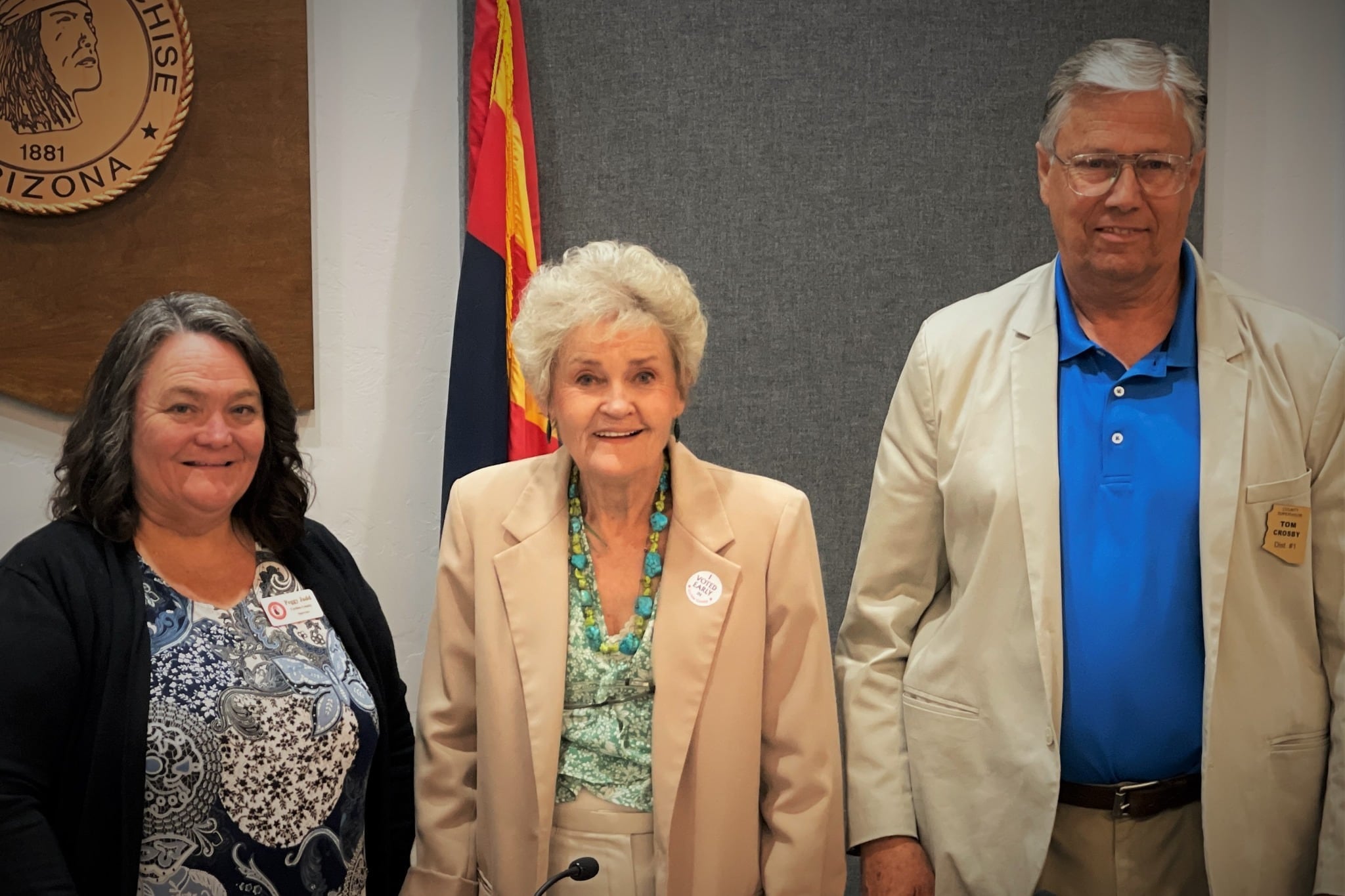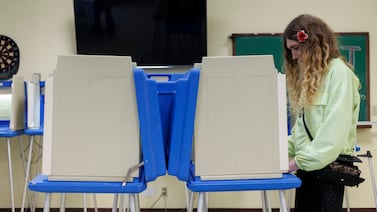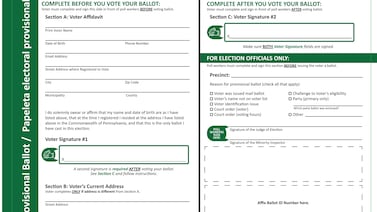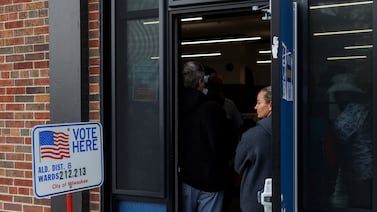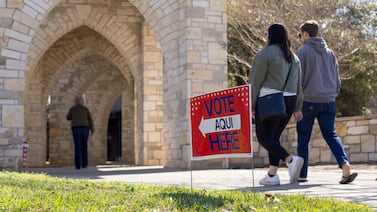Votebeat is a nonprofit news organization reporting on voting access and election administration across the U.S. Sign up for our free newsletters here.
Arizona Attorney General Kris Mayes is investigating two Cochise County supervisors who refused to certify the county’s midterm election results by the state-required deadline.
Supervisors Tom Crosby and Peggy Judd, both Republicans, were served subpoenas last week by Mayes’ office explaining that they are under investigation and ordering them to appear before the state grand jury on Nov. 13, according to a Votebeat review of Judd’s subpoena and a Herald Review report of Crosby’s subpoena. Judd’s subpoena has not been previously reported.
The subpoenas do not specify the criminal violations that the office is investigating. But Cochise County Supervisor Ann English, the third member of the three-member board and the only Democrat, told Votebeat that she was interviewed Tuesday by an investigator from Mayes’ office who asked her about Crosby and Judd’s refusal to certify the election, along with their push to hand-count all ballots during the county’s post-election audit.
Trial court judges deemed both actions illegal at the time, forcing the officials to vote to certify and blocking the full hand count of ballots. English, who had voted to certify and against moving forward with the full hand count, said she has not been served with a subpoena.
Mayes’ office said it could not divulge the topic of any grand jury investigation, citing a state law that prohibits discussion of grand jury matters.
Mayes’ probe of the southern Arizona county’s attempts to disrupt the midterm election results could deter county officials who may want to do the same during the upcoming presidential election. Former state Attorney General Terry Goddard, a Democrat who had called for an investigation on the supervisors’ refusal to certify the election, was glad to hear it was underway.
“Elected officials don’t just get to pick the laws they want to follow,” he told Votebeat.
The grand jury process is the only way that Arizona law allows attorney generals to pursue a criminal prosecution. It will be up to a grand jury of nine to 16 citizens to decide whether to indict the supervisors. It’s a felony in Arizona for an elections officer to knowingly refuse to perform a duty prescribed to them under state law, or to act in violation of state law. This could be a Class 3 or Class 6 felony, which carry potential jail time and fines.
Lisa Marra, Cochise County’s elections director during the midterm, called Mayes’ investigation “important.” Crosby and Judd sued her personally last year, alleging she was attempting to prevent the full hand count. It’s part of what led her to resign.
“The lesson now is if people or voters or counties violate laws, they will be investigated and prosecuted if it rises to that legal threshold,” Marra, who now works for Secretary of State Adrian Fontes, said in an interview this week. Marra said she hasn’t been interviewed or subpoenaed by Mayes’ office.
Judd said she doesn’t regret her actions, but she does feel misled by the outside legal advice she received from private attorneys. “They all used me,” she said. “And it makes me sad.”
She said she now knows the law and would act differently when faced with a similar decision in 2024.
“I don’t regret a single minute or single word,” she said. “I just know now what’s possible and what’s not possible, and I refuse to go there.”
Crosby did not respond to messages asking him to confirm the subpoena and for comment. It’s unclear whether any other county officials were subpoenaed or interviewed. Marra said she has not been.
Cochise supervisors swayed by GOP push
Cochise was the only county to bend to pressure from GOP leaders and activists from across the state who immediately after Election Day began claiming the results were inaccurate and asking county supervisors not to certify the election. Lawsuits from gubernatorial candidate Kari Lake, attorney general candidate Abraham Hamadeh, and secretary of state candidate Mark Finchem challenging the election results were eventually dismissed due to lack of evidence.
Under Arizona law, county supervisors must vote to certify, or canvass, their county’s election within 20 days of a general election. It’s a ministerial act, which means supervisors have no discretion as to whether to approve the results. The only exception is if there are any missing returns among polling place results — and even that only warrants a temporary postponement. The secretary of state, in turn, is required to certify the statewide election on the fourth Monday after the election.
Crosby and Judd first voted to postpone the county’s canvass until the Nov. 28 deadline, after residents spread unfounded claims that ballot tabulation machines used throughout the state were not properly certified. Kori Lorick, the state elections director, personally provided documentation to the supervisors showing the machines were certified, yet still Judd said at the time that it was “alarming that there was something going on.”
Crosby was also dismissive of Lorick.
“Is she of higher and greater importance than our citizens?” Crosby said.
When the final deadline of Nov. 28 arrived, Crosby and Judd voted against certification. They did so against the advice of the County Attorney’s Office, which had explained to them that they had a non-discretionary duty.
The Secretary of State’s Office, at the time run by now-Gov. Katie Hobbs, then sued the supervisors, who could only rely on private counsel to represent them on the matter, since they had acted against the county attorney’s advice. Their attorney did not appear in court. The trial court judge then forced them to reconvene and vote to certify. They did, but the vote was still 2-0: Crosby did not show up.
Crosby and Judd had also, just prior to the election on Oct. 24, voted to expand the limited post-election hand-count audit of ballots required under state law to a hand count of all ballots.
They did so after a GOP pressure campaign to end the use of tabulation machines, and it was also against the advice of the county attorney, who explicitly said their plan would be illegal.
In fact, Judd said at the time that she was aware she “might go to jail” for her vote.
A judge blocked the plan the day before the election. Yet, for a moment, it appeared County Recorder David Stevens was moving forward anyway when he went around Marra and took the first steps towards a hand-count audit. Stevens’ count never came to be, though.
A state appeals court last week upheld the trial court’s decision that a full hand-count audit is illegal.
Mayes has also opened an investigation into five open meeting law violations by the county supervisors, three of them related to elections. One alleged violation was Crosby and Judd’s decision to sue Marra. The two hired a lawyer to sue her without voting on the matter at a public meeting. They later dropped the lawsuit.
It’s unlikely that Mayes would bring the open meeting law investigations to a grand jury, as state law gives Mayes the power to fine officials for open meeting law violations without a grand jury proceeding.
Judd said she now understands that she should have drawn a firmer line. “When the laws are different and the world is different, maybe we can have hand counting and all the stuff you want,” she said. “But sometimes you just need to say no.”
English said a Mayes investigator questioned her for about 15 minutes on both the refusal to certify and the lawsuit related to the push to hand-count all ballots. One of the questions, she said, was about how many times her fellow supervisors refused to certify before the judge forced them to.
The grand jury subpoena told Crosby and Judd that they will be asked questions and may be asked to produce records and documents. They were advised they can have an attorney present to represent them.
Judd said that County Attorney Brian McIntyre has told her he will not represent her.
Under state law, public officials and employees can’t be held personally liable for following the advice of their attorney. But in this case, the supervisors went against the county attorney’s advice.
Former prosecutors call for investigation
Mayes’ investigation of Crosby and Judd comes as she also investigates the state’s fake electors plot to overturn the 2020 election results. Her investigation has expanded to consider Trump allies’ pressures on local elected officials, according to The Washington Post.
Mayes first took office in January. Her predecessor, former Republican Attorney General Mark Brnovich had not opened an investigation into these matters.
Brnovich was in his final months in office during the midterm disruptions in Cochise County. Shortly after, on Dec. 2, Lorick, then the state elections director — working for former secretary of state and now Gov. Katie Hobbs—- wrote him a letter asking him to investigate Crosby and Judd’s failure to certify in a timely manner and hold them accountable.
“Had a court not intervened, the failure of these two Supervisors to uphold their duty would have disenfranchised thousands of Cochise County voters,” Lorick wrote. “This blatant act of defying Arizona’s election laws risks establishing a dangerous precedent that we must discourage.”
Goddard and former Maricopa County Attorney Rick Romley, a Republican, also wrote Brnovich and Cochise County Attorney Brian McIntyre asking them to investigate, writing that the supervisors’ actions threatened “to undo the proper administration and integrity of elections, disenfranchise thousands of voters and potentially even alter the results of some races.”
In an interview this week, Romley said he thinks the public is tired of the “circus performances” surrounding the state’s elections.
“They want their elected officials to be the grownups in the room, to do what is right for their system and to bring stability and honesty for their government,” he said.
Jen Fifield is a reporter for Votebeat based in Arizona. Contact Jen at jfifield@votebeat.org.

